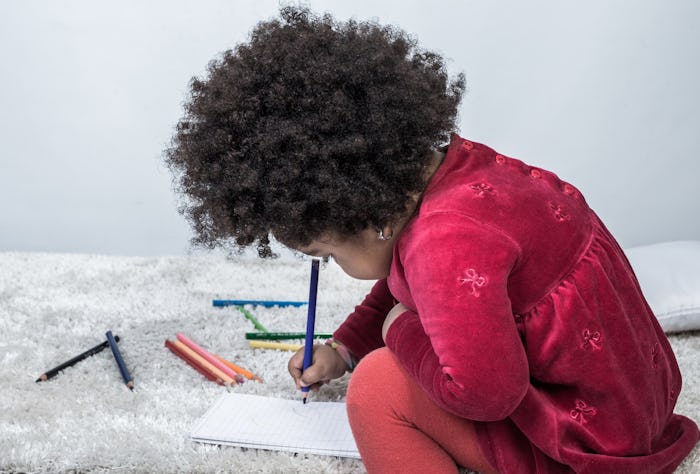Life

9 Early Signs Your Kid Will Be Gifted
If your child has seemed different from a young age, there may be a chance that you have a "gifted child" on your hands. But are there any early signs your kid will be gifted or do you need to wait until they're in school to determine where they fall on the gifted scale? Most sources say the signs start showing up early in most gifted children.
According to the National Association for Gifted Children (NAGC) gifted children are those "who demonstrate outstanding levels of aptitude or competence in one or more domains." The site noted that domains include "any structured area of activity with its own symbol system (e.g., mathematics, music, language) and/or set of sensorimotor skills (e.g., painting, dance, sports).” Simply put, if your child shows early signs of high intelligence — be it cognitive, emotional, creative, or physical — they very well may be gifted in at least one area.
However, if you suspect your toddler or child is gifted, don't rush them off to be tested right away. An expert from What To Expect suggested parents simply nurture their child's behavior, instead of insisting of defining it. Let them grow in their strengths, discover things for themselves, and thrive.
Although the term "gifted" is slightly ambiguous and hard to define, having a gifted child is an adventure worth embracing. Here are a few signs your child may fall under the gifted umbrella.
1They Have A Specific Talent That They Excell At
According to Baby Center most children who are gifted will have a specific area of "expertise" that they'll excel at. For example, maybe they have an ease with numbers or learned how to draw at an early age.
2They Reach Developmental Milestones Well Ahead Of Their Peers
Did your baby learn to roll, walk, talk, or start speaking well ahead of other babies their age? Although that may not always mean your child will be gifted, reaching milestones early is a sign on the NAGC's list of traits most gifted children display.
3They Have An An Extensive Vocabulary
Not only do gifted kids usually talk earlier, but they'll use words that most kids their age just don't understand yet, according to PopSugar.
4They Can Concentrate On One Task For A Long Period Of Time
One of the NAGC's traits for kids who display cognitive giftedness is being self-motivated and able to focus on one task for a long period of time — if it's in line with their interests.
5Their Imagination Is Very Vivid
Gifted Development lists a checklist of traits many gifted children show and among them is a vivid imagination. Gifted kids will often have detailed imaginary friends, or create scenarios in their minds that rival reality.
6They Remember Facts Well, But Gets Bored With Memorizing And Recitation
Rote recitation won't excite gifted kids, but if your child has an ability to remember slight details, events, or facts from a young age, they may be gifted according to Baby Center.
7They Have A Need For Consistency And Predictability
Although some gifted children, particularly ones that lean towards creativity, don't have this need for routine, many do. Often, according to the NAGC, gifted children thrive best in predictable situations, where they can stretch their mind while feeling secure. This need may start young, if you notice a strong need for routine in your child's life, they very well may display other traits of giftedness as well.
8They Like Solving Problems On Their Own
Though independence is a trait that most kids (especially toddler) display at some point, gifted children will do it to the extreme. In addition to being self-motivated, gifted children love the feeling of accomplishment when they solve problems on their own, according to PopSugar.
9They're Very Inquisitive And Curious About The World Around Them
Nearly every gifted child, no matter their area of giftedness, will display a love of learning and will likely ask questions about the world around them from a young age. The NAGC lists "intellectual curiosity," "insatiable curiosity," and "unusual emotional depth" as traits that children may show.